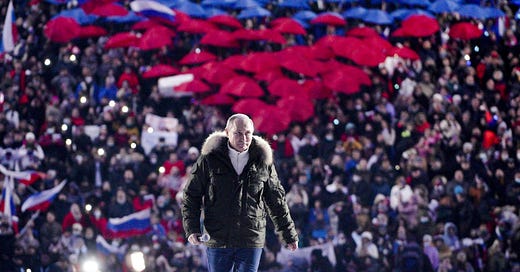As History Teaches Us, It Is the Russian People Who Hold the Key to Ending Putin’s War in Ukraine.
Even the most ferocious dictators cannot survive without the consent of the people.
More than 50 days after the beginning of the Russian military offensive in Ukraine, we are still wondering what will put an end to this odious war decided by Vladimir Putin. However, there are many reasons, from a coup against Vladimir Putin to a negotiated settlement of the conflict.
Nevertheless, if history is any guide, there is one reason in particul…
Keep reading with a 7-day free trial
Subscribe to Sylvain Saurel’s Newsletter to keep reading this post and get 7 days of free access to the full post archives.




